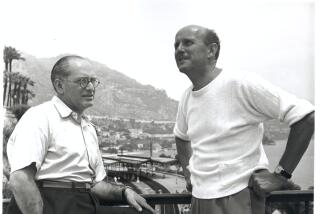William Powell, author of counterculture manifesto ‘The Anarchist Cookbook’, dies at 66
- Share via
An enraged 19-year-old, William Powell holed up in the bowels of the New York City Public Library and pored through every shred of mayhem he could find — declassified military documents, Army field guides, electronic catalogs, insurrectionist pamphlets, survivalist guidebooks.
The material formed the bedrock for “The Anarchist Cookbook,” a crude though clever how-to book for aspiring terrorists, troublemakers and would-be revolutionaries.
Published as the Vietnam War continued to boil and the Summer of Love faded in the distance, the book became a bestseller and an instant manifesto of dissent in America, as ubiquitous in a college dorm room as a Che Guevara poster or a copy of the “Whole Earth Catalog.”
But as the decades passed, Powell came to see the book as a misstep, a vast error in judgment.
Confronted late in life by the makers of the documentary “American Anarchist,” Powell seemed to buckle at the thought that his book had been tied to Columbine, the Oklahoma City bombing, and a litany of other atrocities.
But if there was blood on his hands, he didn’t fully acknowledge it.
“I don’t know the influence the book may have had on the thinking of the perpetrators of these attacks, but I cannot imagine it was positive.”
Long an expatriate, Powell died of a heart attack July 11 during a vacation with his wife, children and grandchildren in Halifax, Canada. His death only became public when it was noted in the closing credits of “American Anarchist,” which premiered Friday. . His death was also disclosed on a Facebook page devoted to Powell’s work as a special education teacher in Africa and Asia. He was 66.
“The Anarchist Cookbook,” which has sold at least 2 million copies — printed, downloaded or otherwise — and remains in publication, was originally a 160-page book that offered a nuts-and-bolts overview of weaponry, sabotage, explosives, booby traps, lethal poisons and drug making. Illustrated with crude drawings, it informed readers how to make TNT and Molotov cocktails, convert shotguns to rocket launchers, destroy bridges, behead someone with piano wire and brew LSD.
The book came with a warning: “Not for children or morons.”
In a foreword, Powell advised that he hadn’t written the book for fringe militant groups of the era like the Weathermen or Minutemen, but for the “silent majority” in America, those he said needed to learn the tools for survival in an uncertain time. Powell himself was worried about being drafted and was an outspoken critic of the Vietnam War and President Nixon.
“This book is for anarchists — those who feel able to discipline themselves — on all subjects (from drugs to weapons to explosives) that are currently illegal or suppressed in this country,” he wrote.
Critics brushed the book off both as “reckless” and “pointless”; the FBI took note but decided any intervention would only stoke further interest in the book. Activists associated with militant groups branded it a transparent attempt to profit off the discord in America.
Powell said he received death threats and retreated to Vermont. He held only one press conference after the book was published, and it had been interrupted when someone hurled stink bombs toward the author.
In more recent publications, the book appears to have grown shorter and readers on Amazon have complained that it has been heavily edited. One reader said he was gravely disappointed to find out that a recipe for napalm had been cut from the book.
Powell eventually found a more conventional life, returning to college, earning a master’s degree in English, becoming a teacher, getting married and raising a family. He also led a nomadic life, teaching special needs children as he roamed the world with his wife and children, traveling from China to Tanzania.
The book itself never made him rich. He conceded years later than the copyright had been held from the start by the book’s original publisher, Lyle Stuart Inc., and that at best he had made $50,000 off the book.
Powell said he became a Christian and found himself increasingly uncomfortable with the book, which had tailed him like a shadow, sometimes standing in the way of a job or testing a friendship. In the late 1970s, he asked the publisher to take “The Anarchist Cookbook” out of publication. His request was rejected.
The author did, though, add a cautionary note to would-be buyers on Amazon, condemning his own book as “a misguided product of my adolescent anger.” He said the book should no longer be in print. He stopped short of urging people not to buy it, though his feelings were clear.
“The central idea to the book was that violence is an acceptable means to bring about political change,” he wrote. “I no longer agree with this.”
In 2013 he wrote a first-person story for the Guardian, again expressing remorse for the book and noting that he had more than atoned for it with decades of teaching and public service in the poorest and least developed countries in the world. He concluded that as a teen, he had accepted the notion that violence could be used to prevent violence.
“I had fallen for the same irrational pattern of thought that led to U.S. military involvement in both Vietnam and Iraq,” he wrote. “The irony is not lost on me.”
On a Facebook remembrance page, filled with condolences and fond memories from students, fellow teachers and family members, there is no obvious mention of the book that made him noteworthy. There is, though, evidence Powell had carved out a far different reputation in the classroom.
“If I have made any difference or had any impact on student’s lives since I began teaching overseas it is because Bill was the catalyst,” wrote Kenny Peavy. “He was the first one to take the time to truly see.”
More to Read
Start your day right
Sign up for Essential California for the L.A. Times biggest news, features and recommendations in your inbox six days a week.
You may occasionally receive promotional content from the Los Angeles Times.








